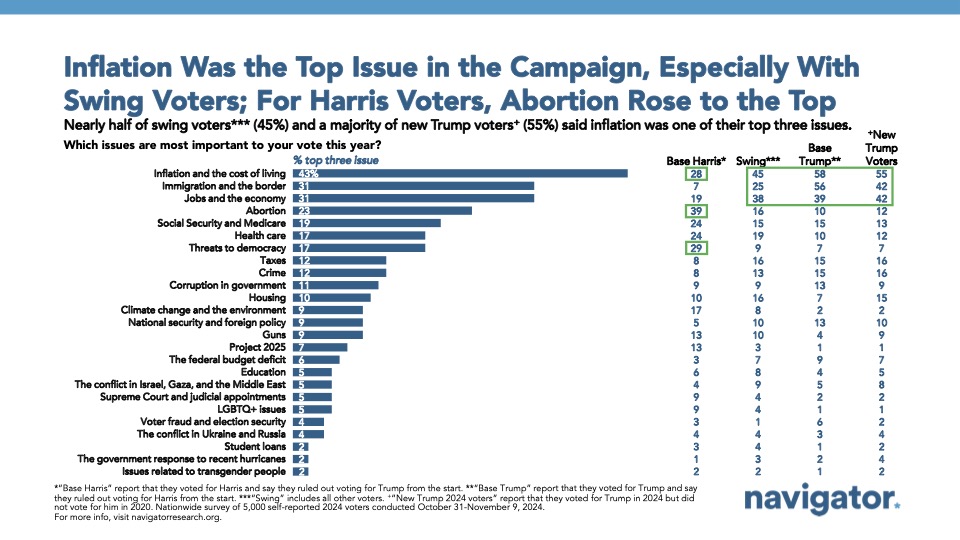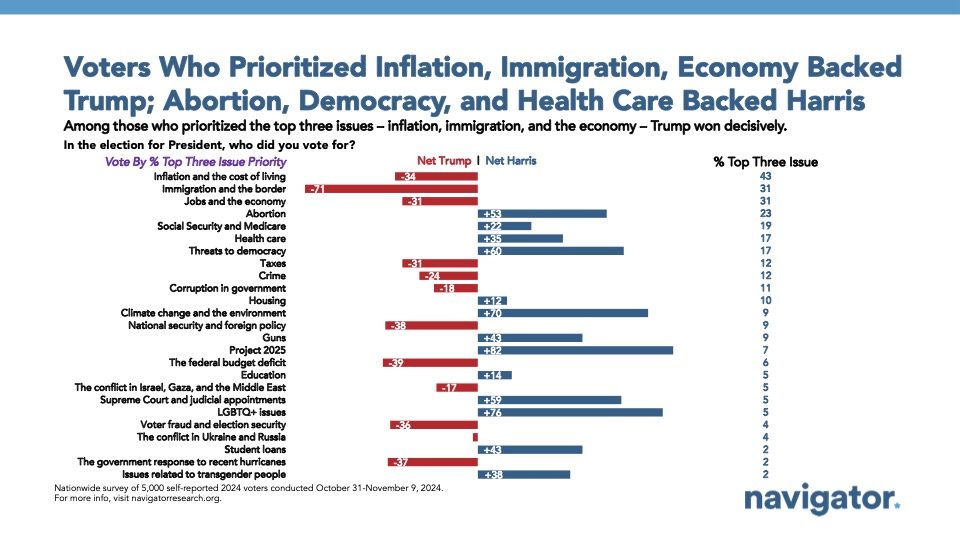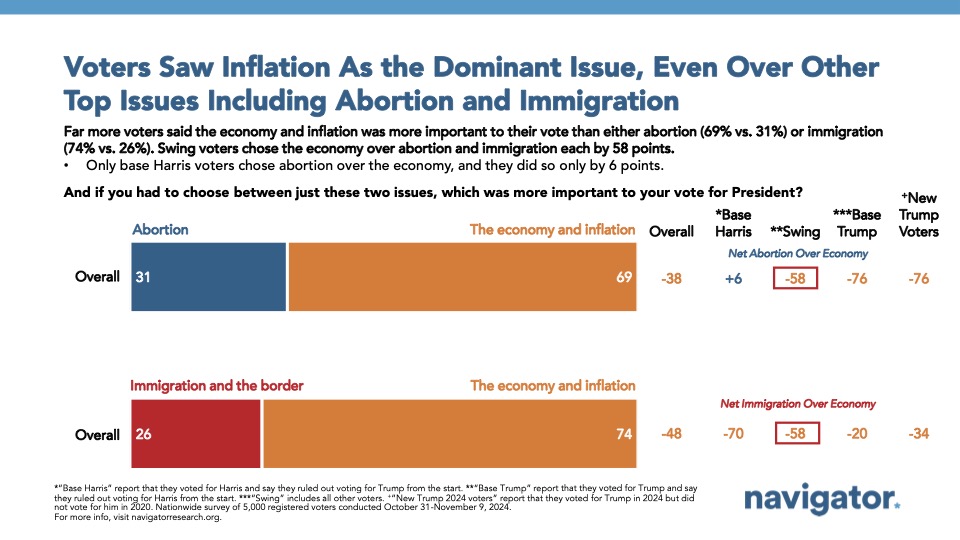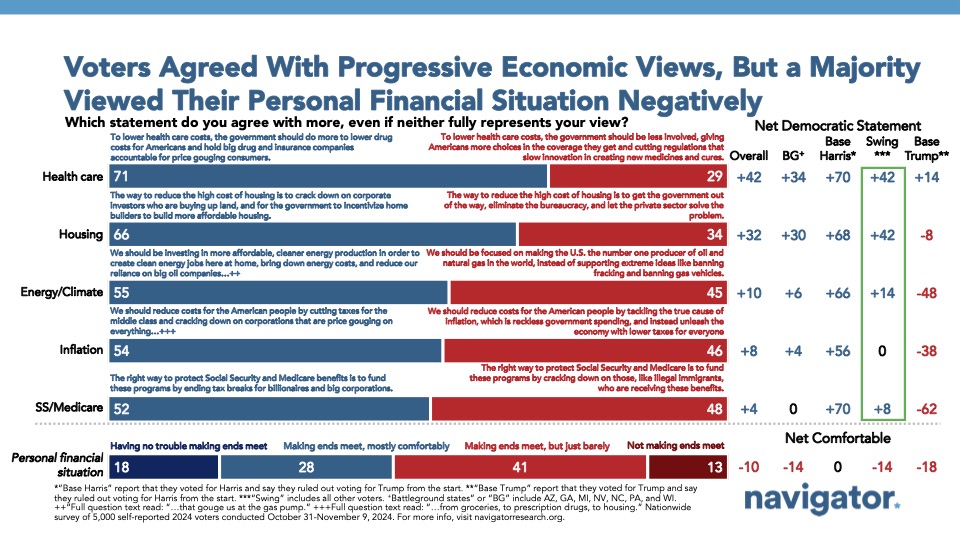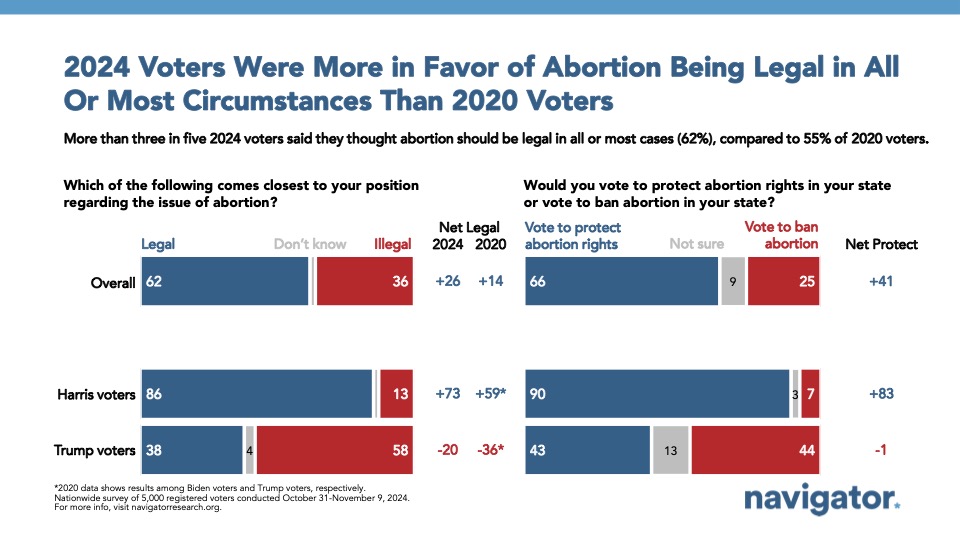2024 Post-Election Survey: Ideological Debates of the Election
This Navigator Research report is the fourth in a series of releases of findings from our post-election survey among 5,000 self-reported 2024 general election voters.* This release focuses on the top issues for voters going into the 2024 election and attitudes voters had on a variety of different ideological debates at stake in the election, including the economy, health care, abortion, housing, and immigration.
The most important issues to 2024 voters in this election were inflation and the cost of living, immigration and the border, and jobs and the economy. By double digits, voters overall were most likely to rate inflation and the cost of living as one of the three most important issues for their vote this year (43 percent, including 45 percent of “swing voters” who did not rule out voting for Trump or Harris from the start of the campaign, and whom Trump won by 8 points) over other top issues like jobs and the economy (31 percent, including 38 percent of “swing voters”) and immigration and the border (31 percent, including 28 percent of “swing voters”). Donald Trump won by 34 points among those rating inflation and the cost of living as one of their most important issues, by 31 points among those rating jobs and the economy as one their most important issues, and by 71 points saying the same about immigration and the border.
- There was a clear second tier of issues that were also rated as important to 2024 voters behind these three issues, including abortion (23 percent, including 16 percent of “swing voters”), Social Security and Medicare (19 percent, including 15 percent of “swing voters”), health care (17 percent, including 19 percent of “swing voters”), and threats to democracy (17 percent, including 9 percent of “swing voters”). Kamala Harris won by 53 points among those prioritizing abortion, by 22 points among those prioritizing Social Security and Medicare, by 35 points among those prioritizing health care, and by 60 points among those prioritizing threats to democracy.
- The economy and inflation proved to be the most dominant issue: in forced choice questions between two issues, the economy and inflation was picked by 69 percent of voters compared to just 31 percent who picked abortion, and was picked by 74 percent of voters compared to just 26 percent who picked immigration and the border.
A majority of the 2024 electorate aligns with more progressive positions on economic issues than conservative ones. This survey asked voters whether they agreed more with a progressive position or a conservative position on a number of ideological debates. By 42 points, more than seven in ten voters agree more that “to lower health care costs, the government should do more to lower drug costs for Americans and hold big drug and insurance companies accountable for price gouging consumers” (71 percent) than believe that “the government should be less involved, giving Americans more choices in the coverage they get and cutting regulations that slow innovation in creating new medicines and cures” (29 percent). Similarly, 66 percent agree more with a statement that “the way to reduce the high cost of housing is to crack down on corporate investors who are buying up land, and for the government to incentivize home builders to build more affordable housing” compared to just 34 percent who agree more that “the way to reduce the high cost of housing is to get the government out of the way, eliminate the bureaucracy, and let the private sector solve the problem.”
- Narrower majorities also agreed more with progressive positions on investing in more affordable, cleaner energy production over focusing on making the U.S. the number one producer of oil and natural gas (net +10; 55 percent progressive position – 45 percent conservative position) and that we should reduce costs by cutting taxes for the middle class and crack down on corporate price gouging more than we should cut government spending and cut taxes for everyone (net +8; 54 percent progressive position – 46 percent conservative position).
More than three in five 2024 voters believe abortion should be legal, up significantly compared to the share of the 2020 electorate saying the same. By 26 points, 62 percent of 2024 voters believe that abortion should be legal compared to just 36 percent who believe it should be illegal. This is a net 12-point increase compared to the 2020 electorate (net +14; 55 percent legal – 41 percent illegal). Moreover, an even greater share of 2024 voters say they would vote to protect abortion rights in their state than would vote to ban abortion in their state (net +41; 66 percent vote to protect abortion rights – 25 percent vote to ban abortion). In additional questions assessing ideological debates among the 2024 electorate, at least three in five agreed with progressive positions on abortion, including:
- By a two-to-one margin, more agree that “personal decisions around pregnancy and abortion should be left to patients, their doctors, and the people they trust – not the government… we must stop these government bans that deny women the abortion care they need, even in cases of rape, incest, or when their life is at risk” than agree with a statement that “pro-abortion supporters have gone too far… we need to stop abortion on-demand and stop allowing abortions to occur up to or even after the moment of birth” (net +32; 66 percent progressive position – 34 percent conservative position).
- By 20 points, more agree that “we must restore Roe v. Wade and ensure that women — no matter the state they live in — all have access to the care they need and the freedom to make the decisions that are best for their families, without government interference” than agree with the conservative position that “we need to leave abortion law decisions up to the states, so every state can implement the law that is right for them instead of a one-size-fits-all approach” (net +20; 60 percent progressive position – 40 percent conservative position).
About The Study
Global Strategy Group conducted an online survey of 5,000 registered voters from October 31st through November 9th, 2024, with respondents recruited from opt-in online panel vendors. Of that 5,000, 4,784 respondents were verified against a voter file (and the other 216 were voters who said they were registering before voting if interviewed before Election Day) and special care was taken to ensure the demographic composition of the sample reflected that of the expected 2024 electorate. The vote shares for Kamala Harris,
Donald Trump, House and Senate Democrats, and House and Senate Republicans were also adjusted to reflect a preliminary estimate of the vote in the 2024 election. The margin of error for the full sample at the 95 percent
level of confidence is +/- 1.4 percentage points. The margin of error for subgroups varies and is higher.

